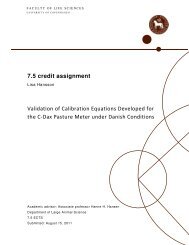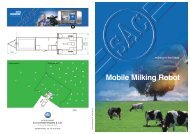Innovative Technology and Sustainable Development of Organic - 1.
Innovative Technology and Sustainable Development of Organic - 1.
Innovative Technology and Sustainable Development of Organic - 1.
You also want an ePaper? Increase the reach of your titles
YUMPU automatically turns print PDFs into web optimized ePapers that Google loves.
would decrease the sales <strong>of</strong> the product. None <strong>of</strong> the participants regarded the use <strong>of</strong> AMS to be a<br />
threat for animal health <strong>and</strong> some Dutch farmers criticized the moderator for even mentioning the<br />
aspect in this assignment, as it was postulated as gossip, brought into the discussion by antitechnology<br />
activists.<br />
Throughout the interviews, the participants mentioned the consumers as an important unknown factor<br />
influencing the sustainability <strong>of</strong> organic dairy production with or without AMS. All participants<br />
agreed that consumers’ own personal health, no use <strong>of</strong> chemicals, more natural methods, <strong>and</strong> animal<br />
health <strong>and</strong> welfare were the most important motives for buying organic products (see Table 6). For<br />
example the statement, “The consumer wants to see the cow outside,” was expressed in all groups.<br />
Some participants claimed that consumers would not know the difference between a dry cow <strong>and</strong> a<br />
lactating cow, <strong>and</strong> the cows in the field a couple <strong>of</strong> hours a day would be enough to satisfy the<br />
consumers’ desires. When more specifically asked about how the farmers <strong>and</strong> advisors thought about<br />
the lack <strong>of</strong> difference between conventional dairy farming <strong>and</strong> the present organic practice, the Dutch<br />
farmers in particular reacted by saying that there was a difference, referring to the consumers’ desire<br />
for small scale, non technological farming. The Danish advisors <strong>and</strong> farmers mentioned the AMS as<br />
an example. According to them, not many consumers know what robotic milking is <strong>and</strong> how it affects<br />
the organic practice, nor the fact that many organic dairy farmers are using it. This gives the<br />
consumers the idea that there is no big difference.<br />
Table 6. What farmers (NL <strong>and</strong> DK) think (quotes) consumers want when they buy organically<br />
produced food. Categorized <strong>and</strong> indexed but not rated (not in priority order).<br />
Category Key issues for the consumers<br />
Personal health no chemicals<br />
better quality<br />
healthier<br />
egocentric buying behaviour<br />
Environment no artificial fertilizer<br />
respect for nature<br />
natural<br />
Animal welfare grazing<br />
better animal welfare<br />
cow outside<br />
Other reasons relatively cheap compared to what<br />
conventional food should cost without<br />
subsidies.<br />
it gives a good image<br />
clear difference from conventional<br />
methods<br />
because <strong>of</strong> sc<strong>and</strong>als in conventional<br />
agriculture<br />
Thesis Frank W. Oudshoorn 31




